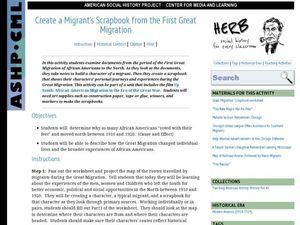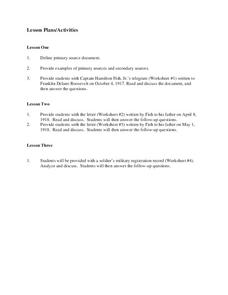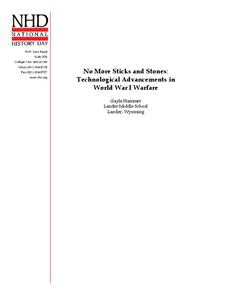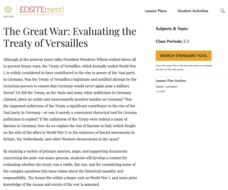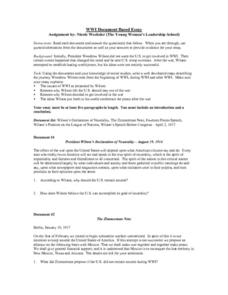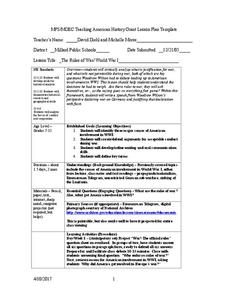American Battle Monuments Commission
Honoring Service, Achievements, and Sacrifice: A WWI Virtual Field Trip
The largest offensive in United States military history comes alive in a online interactive resource. Young historians explore the Meuse Argonne battlefield and scour the landscape for evidence from the battle. They then use primary...
Curated OER
Create a Migrant's Scrapbook from the First Great Migration
Help young historians personally engage in the stories of African Americans during the Great Migration! Assessing a migration route map, learners create a migrant character's experience, adding details while studying primary sources. A...
Curated OER
Primary and Secondary Sources
Learners complete worksheets having to do with primary and secondary source documents. In this sources lesson, students define a primary source document, look at examples of primary and secondary sources. Learners complete multiple...
National History Day
No More Sticks and Stones: Technological Advancements in World War I Warfare
Remind young historians that many technological advancements influenced the events of World War I. After analyzing technology's evolution through primary sources, discussing the changes over time, and watching various video clips,...
Curated OER
American Soldiers’ Experiences During WWI
Students investigate the effects of war on soldiers. In this World War I lesson, students link to the provided Web link to locate primary sources about American soldiers during the war. Students write historical narratives based on their...
Curated OER
The Great War: Evaluating the Treaty of Versailles
Young scholars examine and evaluate the Treaty of Versailles. They read and discuss primary source documents, explore various websites, develop a list of postwar goals for France, Germany, and the U.S., and evaluate whether the treaty...
Syracuse University
World War I
World War I was known for its gruesome battlefields and horrific injuries. Using photographs from a battlefield surgeon's scrapbook, scholars see first-hand what life was like in the trenches. After creating a timeline of the war using...
National History Day
“War Is Hell. We Know it Now.” American Soldiers in the Meuse-Argonne Offensive
Understanding the soldier's experiences during World War I sometimes takes a newscast. Learners see the importance of understanding multiple points of view with a newscast project surrounding the Meuse-Argonne Offensive. Compare and...
National Endowment for the Humanities
Chronicling America: Uncovering a World at War
As part of a study of World War I, class members read newspaper articles from the time that urge American involvement, non-involvement, or neutrality. Using the provided worksheet, groups analyze the articles noting the central argument...
National History Day
Why Did the United States Enter World War I in 1917?
World War I was the first major conflict on a global scale. Using primary documents, learners determine why the United States chose to enter World War I when it did. After analytical writing and group research, the causes of America's...
Curated OER
WWI Document Based Essay
Young scholars read various primary source documents on World War I. After reading each document, they answer discussion questions. Using the internet, they identify the causes of World War I as layed out by President Wilson and his...
Curated OER
Portrayals of Women in World War I
Students explore the contributions of women to the war effort. In this World War I lesson, students examine posters from the era that their instructor has gathered and analyze the message in each of the posters. Students then share their...
Curated OER
Armenian Genocide
As your historians examine the beginnings of WWI, ensure they are familiar with the Armenian Genocide. This basic introductory lesson plan utilizes teacher-led discussion, map analysis, and a Socratic seminar. Not much detail is offered...
Curated OER
United States Entry into World War I: A Documentary Chronology of World War I
Learners identify several important events that led to U.S. involvement in World War I. They examine different explanations, form an opinion about the evidence for each rationale and then create a slideshow to present their findings.
Roy Rosenzweig Center for History and New Media
War and Poetry
A band of brothers or the Devil's agents? Nobel warriors freeing the oppressed or mercenaries working for the military/industrial complex? Groups examine poems from the Civil War, World War I, and World War II to determine the poets'...
Curated OER
Was it a New Deal or a Raw Deal?
Students investigate the facets of the New Deal. In this Great Depression lesson, students research primary documents to explore the pros and cons of the New Deal legislation. Students respond to 1930's newspaper editorials...
Curated OER
U.S. Involvement in WWI – The Zimmerman Note
Students investigate the significance of the Zimmerman Note. In this World War I lesson, students use the provided analysis sheet to analyze the contents of the Zimmerman note and discuss how the note led to U.S. involvement in World War I.
National History Day
Propaganda Posters of World War I: Analyzing the Methods Behind the Images
The power of a picture. During the events surrounding World War I, propaganda posters were widely distributed in American society to sway the emotions of its citizens. By analyzing World War I propaganda posters in the first installment...
Curated OER
Foundations of WWI
Students explore how World War I created a foundation for the United States to become a world power. In this World History lesson, students work in small groups to create posters and an oral presentation to share their findings with the...
Facing History and Ourselves
Analyzing Historical Evidence
High schoolers examine World War I war crimes. In this world history instructional activity, learners use primary and secondary sources to research and understand the systematic nature of the Armenian Genocide. High schoolers reflect on...
Curated OER
World War I: Letters from the Front
Students reesearch life on the home front and the front lines during World War I. They use primary and secondary sources to write letters. Students role-play as soldiers writing letters home and then assume the role of the person...
Curated OER
The Rules of War/World War I
Young scholars explore the reasons the United States became involved in World War I. In this World History lesson, students research the reasons Woodrow Wilson made the decisions he did, prepare a debate and write a paper.
Curated OER
African-American Soldiers After World War I: Had Race Relations Changed?
Students utilize an online database to conduct research and analyze the conditions for African-Americans before and after World War I. They consider the role of the 92nd and 93rd divisions in affecting social change.
Curated OER
League of Nations
Ninth graders examine the purposes and mandate system of the League of Nations. They watch a PowerPoint presentation on the mandate system and complete a fill-in-the-blank worksheet, and participate in a "pick your side" activity.

